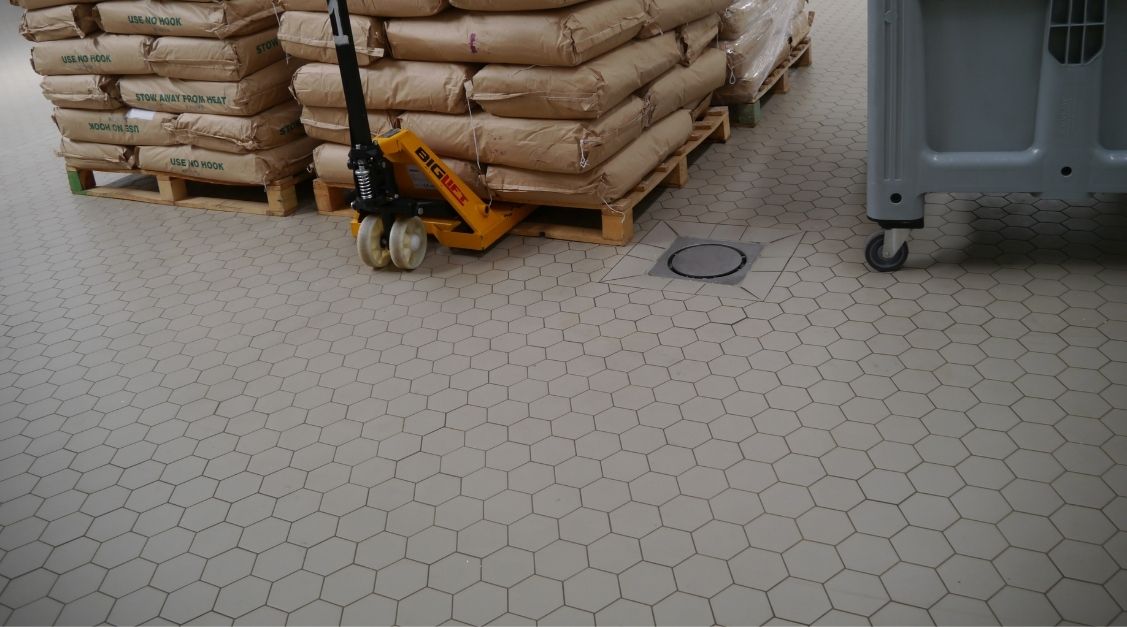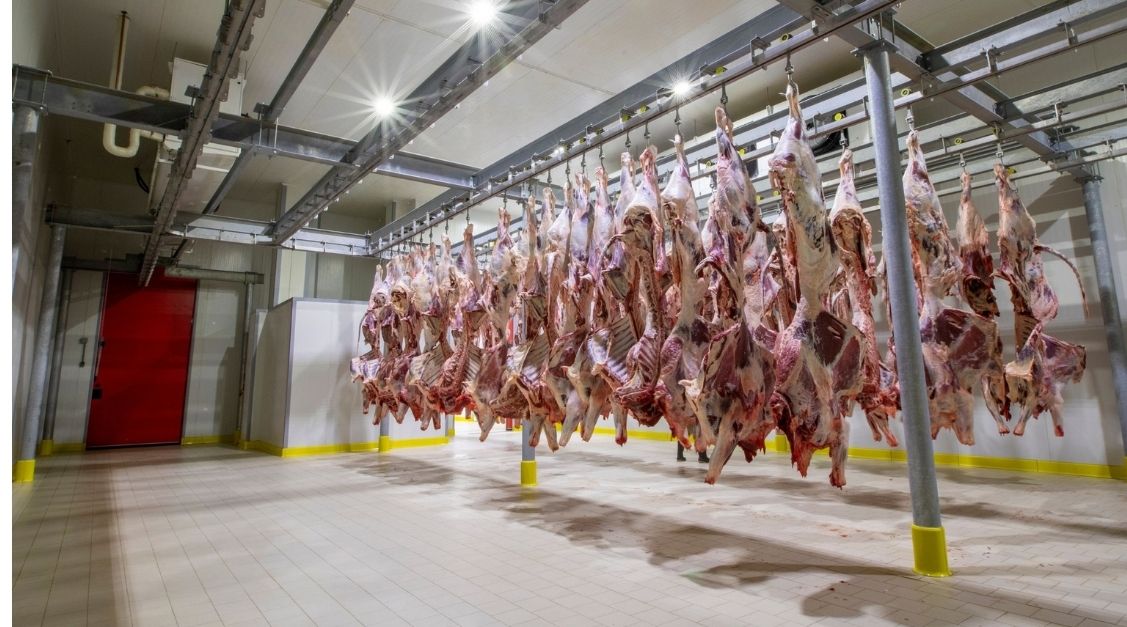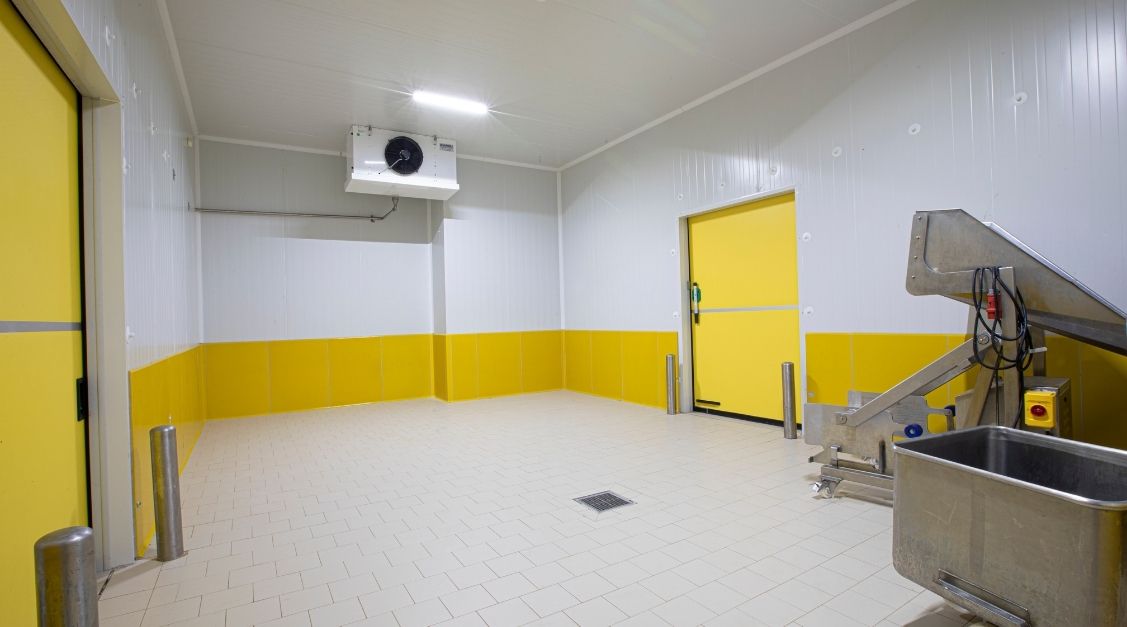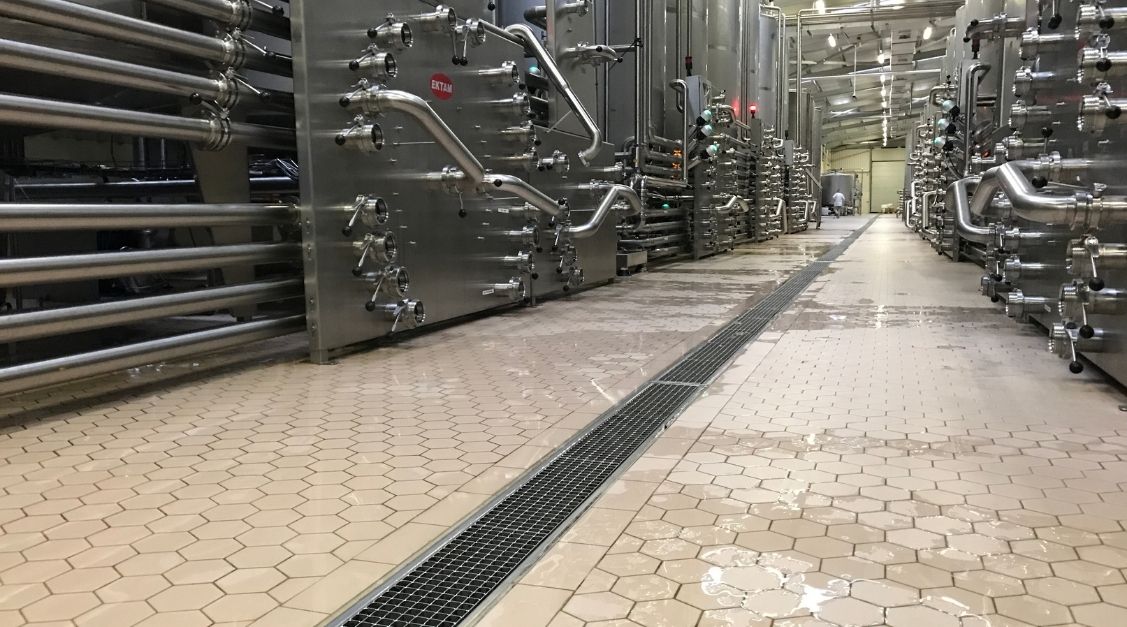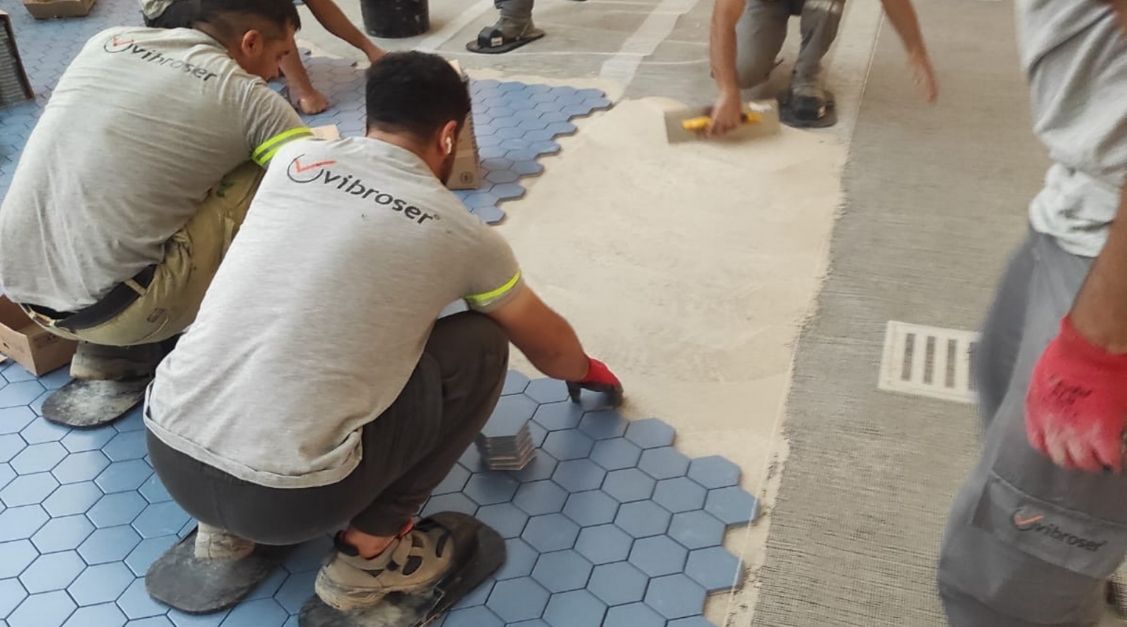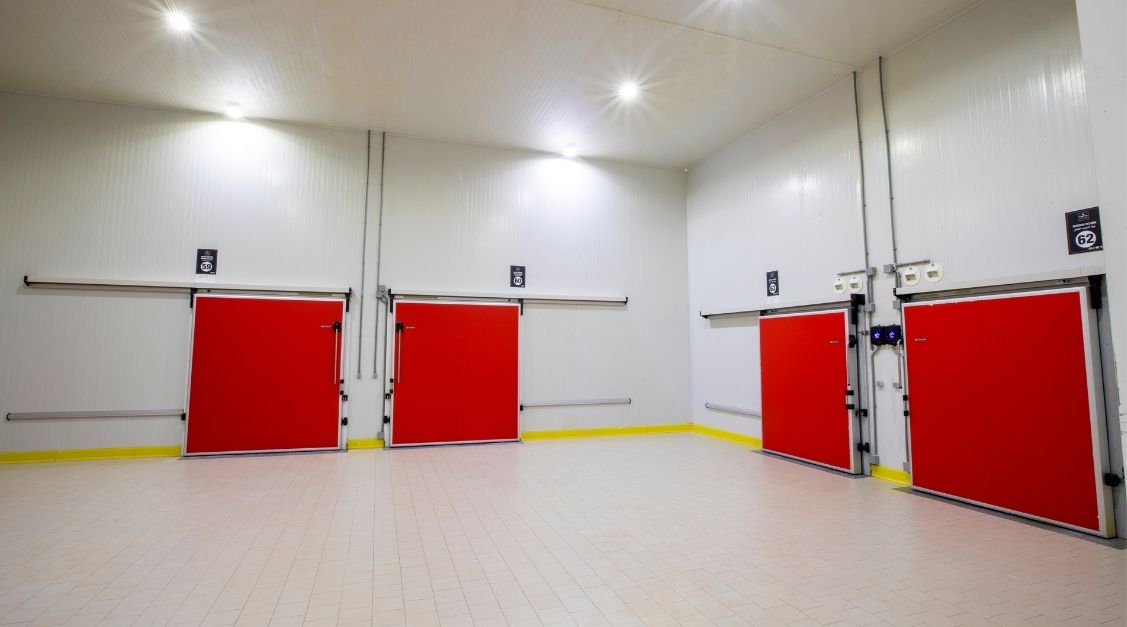Manufacturing plant flooring is a vital element in the infrastructure of any industrial facility, playing a significant role in ensuring both the safety and efficiency of operations, as well as the durability and longevity of the floor itself. When considering the best options for manufacturing plant flooring, heavy-duty industrial tile flooring and industrial epoxy flooring often come to mind. However, another notable option is concrete flooring, which is commonly used due to its initial cost-effectiveness and industrial aesthetic. While concrete flooring may be a traditional choice, it often falls short in comparison to the advanced benefits offered by heavy-duty industrial tiles. These tiles provide unparalleled durability and resilience, far surpassing the capabilities of standard concrete flooring.
Heavy-duty industrial tile flooring stands out for its exceptional features, making it a superior choice for manufacturing plant flooring. These tiles are non-slip and wear-resistant, thanks to their matte surface, which significantly enhances workplace safety. They are not affected by chemicals, oils, and acids, making them ideal for environments where such spills are common. Additionally, these tiles are resistant to high temperatures and can withstand heavy substances and intensive use, showcasing a strength that exceeds conventional concrete floor covering materials. The density of heavy-duty industrial tiles ensures that they do not produce bacteria and do not hold dirt, facilitating a hygienic environment crucial for many manufacturing processes. These tiles are also easy to clean and do not require routine maintenance, unlike some concrete flooring that may need regular sealing or finishing. Moreover, heavy-duty industrial tiles do not change color as they are made from natural materials, ensuring a long-lasting and aesthetically consistent appearance. These environmentally friendly tiles, with their superior strength and low maintenance requirements, make them an optimal choice for manufacturing plant flooring over traditional concrete flooring.
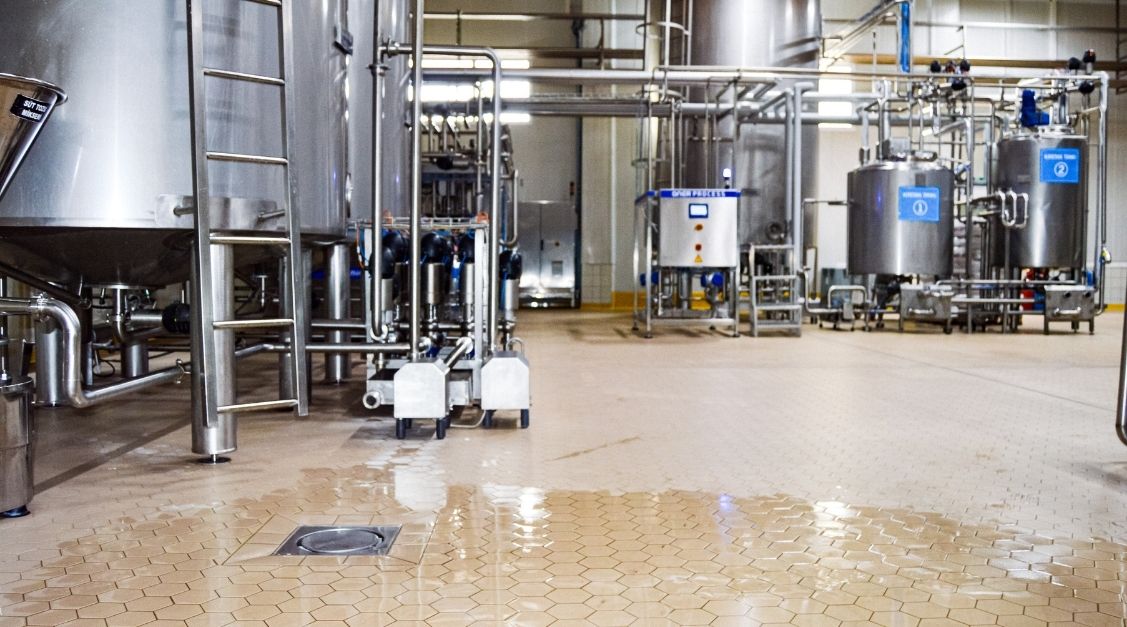
How Heavy-Duty Industrial Tiles Excel in Extreme Industrial Conditions?
Heavy-duty industrial tiles represent the epitome of durability and resilience, making them the top choice for manufacturing plant flooring. These tiles are engineered to endure the extreme conditions typical in industrial environments. The process of creating these tiles involves pressing them at a staggering 4600 tons of pressure and then subjecting them to the intense heat of 1200 degrees in an industrial furnace. This rigorous manufacturing process imbues the tiles with unparalleled strength and durability, positioning them as the most robust material in the construction sector. In manufacturing settings, where floors are subjected to heavy machinery, chemical spills, and constant foot traffic, the resilience of heavy-duty industrial tiles becomes invaluable. While other flooring options like epoxy and concrete are used in factories, they often don’t match the superior performance and longevity that heavy-duty industrial tiles offer.
In the context of manufacturing plant flooring, the choice of material is crucial for ensuring operational efficiency and safety. Heavy-duty industrial tiles not only withstand the rigorous demands of industrial operations but also offer a range of benefits that enhance the overall functionality of the facility. Unlike concrete flooring, which can crack under heavy loads or deteriorate due to chemical exposures, heavy-duty industrial tiles maintain their integrity over time. They are resistant to chemicals, oils, and acids, ensuring that spills and industrial processes do not compromise the floor’s structure or appearance. Furthermore, these tiles are designed to be non-slip and wear-resistant, which is critical in preventing workplace accidents. Their dense composition means they do not harbor bacteria or retain dirt, making them easy to clean and maintain, a significant advantage for facilities that prioritize hygiene. All these attributes make heavy-duty industrial tiles not just a practical choice but the best choice for manufacturing plant flooring, surpassing the capabilities of traditional flooring solutions like concrete and epoxy in industrial settings.
The Flooring of Choice for Tough Industries
In industrial warehouses and explosive industries, the environment presents unique challenges, making the selection of the appropriate manufacturing plant flooring a crucial safety and operational decision. Heavy-duty industrial tiles emerge as the superior flooring option in such scenarios, primarily due to their exceptional durability and inherent safety features. These environments often encounter extreme conditions, including heavy machinery operation, potential explosive materials, and frequent chemical exposure. Heavy-duty industrial tiles are specifically designed to withstand these harsh conditions without compromising their structural integrity. Their resistance to high impact, abrasion, and chemicals ensures that the floor remains safe and intact, even under the most strenuous use. This resilience is particularly critical in explosive industries, where floor durability directly correlates to overall workplace safety.
Similarly, in the pharmaceutical industry, where hygiene and safety standards are exceptionally stringent, heavy-duty industrial tiles are the preferred choice for flooring. This sector demands a flooring solution that not only supports a sterile environment but also withstands the rigorous cleaning protocols necessary to maintain pharmaceutical standards. The non-porous surface of heavy-duty industrial tiles makes them highly resistant to bacteria and contaminants, a key factor in preventing cross-contamination. Furthermore, these tiles are easy to clean and maintain, a vital attribute in an industry where cleanliness is paramount. Their resistance to various chemicals ensures that frequent cleaning and sanitizing processes do not degrade the floor’s quality. Moreover, the durable nature of these tiles means they can withstand the heavy equipment and busy foot traffic common in pharmaceutical manufacturing facilities.
Enhancing Operational Efficiency: Vibroser’s Role in Providing Optimal Industrial Flooring Solutions
Vibroser stands at the forefront of providing versatile and specialized manufacturing plant flooring solutions, catering to a diverse array of industrial needs. Recognizing that each sector has its unique demands and challenges, Vibroser has developed a comprehensive range of flooring options designed to specifically address these varying requirements. Whether the setting is a general manufacturing plant, a high-risk explosive industry, or a stringent pharmaceutical facility, Vibroser’s array of flooring solutions is meticulously engineered to align with the specific needs of each environment. This customization ensures that every sector can find a flooring solution that meets its operational and safety requirements.
Central to Vibroser’s offerings are their heavy-duty industrial tiles, a product that encapsulates the company’s commitment to quality, durability, and safety. These tiles are the cornerstone of Vibroser’s manufacturing plant flooring solutions, renowned for their robustness and ability to withstand the most challenging industrial conditions. In explosive industries, where safety is paramount, these tiles provide a secure and resilient floor that minimizes risks. In pharmaceutical facilities, where hygiene and contamination control are critical, Vibroser’s flooring solutions offer a clean, non-porous surface that is easy to sanitize and maintain. By integrating these high-performance tiles into their flooring systems, Vibroser not only ensures a safe and durable surface but also enhances the operational efficiency of industrial operations. This comprehensive approach to manufacturing plant flooring makes Vibroser a trusted partner for industries seeking reliable and efficient flooring solutions.
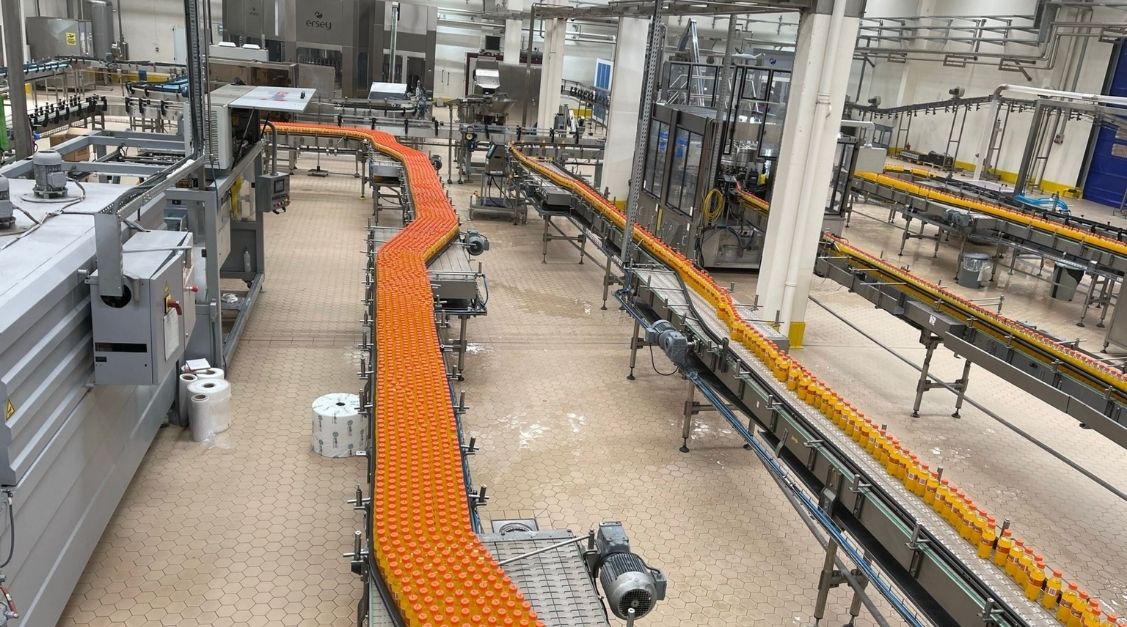
Manufacturing Plant Flooring FAQs for Businesses
What is the best flooring for manufacturing plants?
The best flooring for manufacturing plants depends on the specific requirements and conditions of each facility. However, heavy-duty industrial tiles are often considered among the best choices due to their durability, safety features, and resistance to various industrial challenges.
What type of flooring is used in factories?
In factory settings, the choice of flooring is crucial for operational efficiency and safety, leading to the selection of materials like heavy-duty industrial tiles, epoxy flooring, concrete flooring, and in some cases, specialized rubber or vinyl flooring. Heavy-duty industrial tiles are renowned for their durability and resilience, able to withstand extreme conditions such as heavy machinery use and chemical exposure.
What is the best floor for a food processing plant?
In food processing plants, the ideal flooring solution is heavy-duty industrial tiles, particularly those with acid-proof qualities. These tiles are specifically designed to meet the high standards of hygiene and durability required in the food industry. The unique properties of these tiles make them exceptionally resistant to mechanical, thermal, and chemical stresses, which is crucial in environments frequently exposed to various chemicals and rigorous cleaning processes. The acid-proof tile flooring system, therefore, becomes not just a preference but a standard in the food industry, ensuring that floors remain hygienic, safe, and durable over extended periods, even under the most challenging conditions. This makes them a top choice for maintaining cleanliness and operational efficiency in food processing facilities.
What is the best flooring for an industrial warehouse?
In industrial warehouses, especially those with frequent traffic from pallet jacks, forklifts, trucks, and other wheeled vehicles, heavy-duty industrial tiles stand out as the superior flooring choice. These tiles are engineered for unparalleled durability, safety, and low maintenance, ideally suited to withstand the rigorous demands of industrial environments, including the stress and weight from constant vehicular traffic. Unlike epoxy floors, which may deteriorate or sink over time under heavy load, heavy-duty industrial tiles retain their structural integrity and surface quality. Their non-slip surfaces enhance safety, while their resistance to chemicals and stains makes them ideal for diverse material handling. Additionally, the ease of cleaning and maintenance ensures that the warehouse floor remains in excellent condition, reducing the need for frequent repairs or replacements. This combination of durability, resilience to vehicular pressure, and maintenance ease makes heavy-duty industrial tiles a cost-effective and reliable flooring solution for the challenging conditions of industrial warehouses.
What is the best heavy-duty industrial flooring?
In the realm of industrial flooring, heavy-duty industrial tiles are often regarded as the best option, particularly for environments that demand high durability and resilience. These tiles excel in withstanding the rigorous challenges of industrial settings, including exposure to heavy machinery, chemical spills, and constant foot traffic. Their robust construction ensures they can bear significant weight and resist wear and tear over time. Additionally, these tiles offer chemical and thermal resistance, making them suitable for a variety of industrial processes. Safety-wise, they are designed with non-slip surfaces to prevent workplace accidents. The ease of maintenance is another significant advantage, as they require minimal upkeep while retaining their appearance and functionality. Moreover, the aesthetic versatility of these tiles allows for customization to suit different industrial environments. Altogether, heavy-duty industrial tiles combine strength, safety, and practicality, making them an optimal flooring choice for industrial applications.

